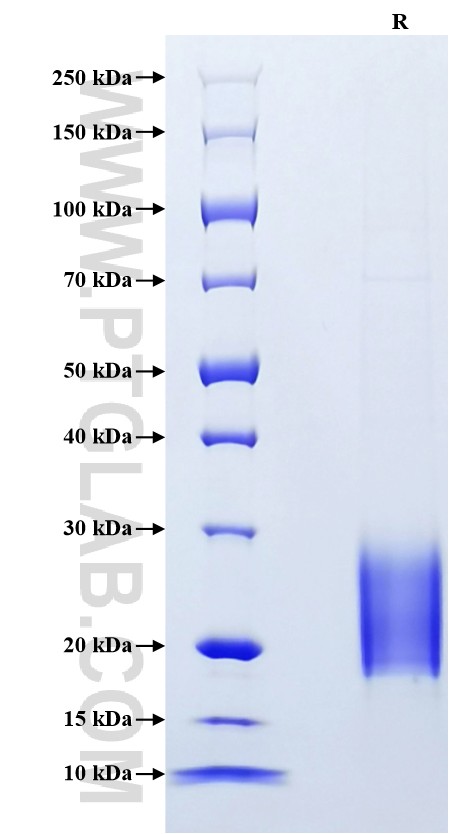Recombinant Human IL-5 protein (His Tag)
种属
Human
纯度
>90 %, SDS-PAGE
标签
His Tag
生物活性
未测试
验证数据展示
产品信息
| 纯度 | >90 %, SDS-PAGE |
| 内毒素 | <0.1 EU/μg protein, LAL method |
| 生物活性 |
Not tested |
| 来源 | HEK293-derived Human IL-5 protein Ile20-Ser134 (Accession# P05113-1) with a His tag at the C-terminus. |
| 基因ID | 3567 |
| 蛋白编号 | P05113-1 |
| 预测分子量 | 17.5 kDa |
| SDS-PAGE | 18-30 kDa, reducing (R) conditions |
| 组分 | Lyophilized from 0.22 μm filtered solution in PBS, pH 7.4. Normally 5% trehalose and 5% mannitol are added as protectants before lyophilization. |
| 复溶 | Briefly centrifuge the tube before opening. Reconstitute at 0.1-0.5 mg/mL in sterile water. |
| 储存条件 |
It is recommended that the protein be aliquoted for optimal storage. Avoid repeated freeze-thaw cycles.
|
| 运输条件 | The product is shipped at ambient temperature. Upon receipt, store it immediately at the recommended temperature. |
背景信息
IL-5 (interleukin-5) is a key cytokine, secreted mainly by Th2 cells and mast cells, that plays an important role in the development, differentiation and activation of eosinophils. IL-5 promotes eosinophil maturation, survival and degranulation through signaling mediated by its receptor (IL-5R), thus playing a role in allergic reactions and inflammatory processes. In allergic diseases (e.g., asthma), elevated levels of IL-5 are associated with a large increase in eosinophils, making IL-5 a potential target for the treatment of these diseases. For example, anti-IL-5 monoclonal antibodies (e.g., mepolizumab and rilizumab) have been approved for the treatment of severe eosinophilic asthma. In addition, IL-5 plays a role in other eosinophil-associated diseases (e.g., nasal polyps) and may be involved in the regulation of the tumor microenvironment.
参考文献:
1. Jackson, David J et al. Allergy vol. 79,11 (2024): 2943-2952. 2. Dougan, Michael et al. Immunity vol. 50,4 (2019): 796-811. 3. Blomberg, Olga S et al. Cancer cell vol. 41,1 (2023): 106-123.e10. 4. Gevaert, Philippe et al. International forum of allergy & rhinology vol. 12,11 (2022): 1413-1423.


